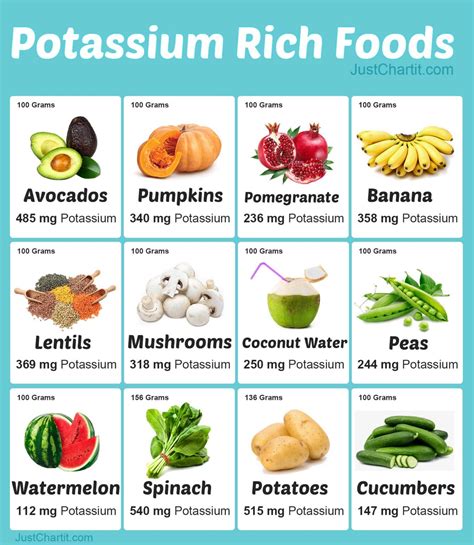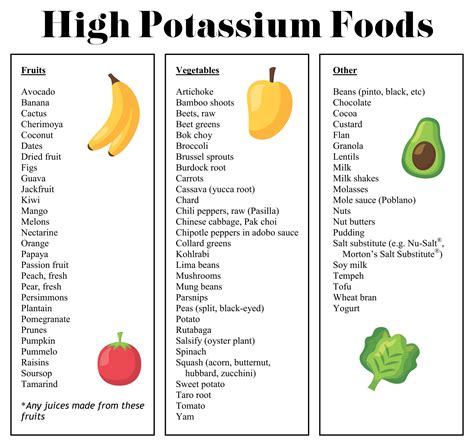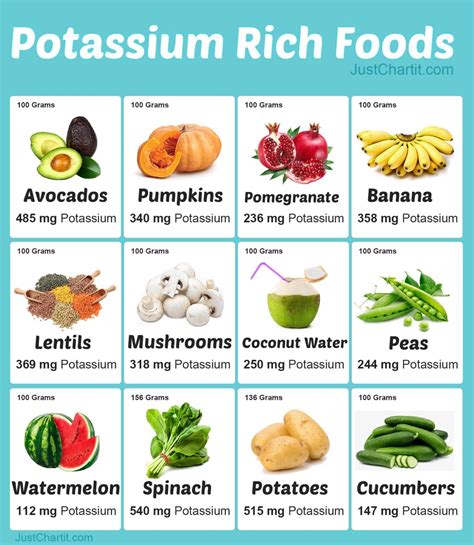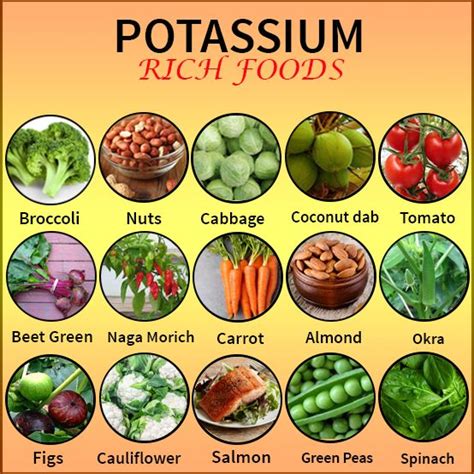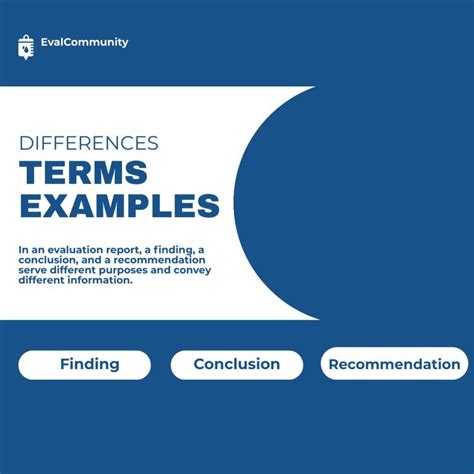Potassium is an essential mineral that plays a crucial role in maintaining various bodily functions, such as regulating blood pressure, supporting healthy heart function, and aiding in muscle recovery. A diet rich in potassium can help mitigate the risks of chronic diseases, including cardiovascular disease, stroke, and osteoporosis. With the numerous benefits of potassium, it is essential to incorporate foods high in potassium into our daily meals.
A well-balanced diet that includes a variety of whole foods can provide adequate amounts of potassium. Fresh fruits, vegetables, whole grains, and lean proteins are all excellent sources of potassium. Some of the richest sources of potassium include leafy greens, such as spinach and kale, as well as root vegetables like sweet potatoes and carrots. Additionally, fatty fish like salmon and avocados are also high in potassium, making them excellent additions to a healthy diet.
Incorporating potassium-rich foods into our diets can have a significant impact on our overall health and well-being. Potassium helps to counterbalance the effects of sodium, reducing blood pressure and the risk of cardiovascular disease. Furthermore, potassium supports healthy bone density, reducing the risk of osteoporosis and fractures. With the numerous health benefits of potassium, it is essential to prioritize potassium-rich foods in our daily meals.
Benefits of Potassium-Rich Foods
Potassium-rich foods offer numerous health benefits, from regulating blood pressure to supporting healthy bone density. Some of the key benefits of potassium-rich foods include:
* Regulating blood pressure: Potassium helps to counterbalance the effects of sodium, reducing blood pressure and the risk of cardiovascular disease.
* Supporting healthy heart function: Potassium plays a crucial role in maintaining healthy heart function, reducing the risk of heart disease and stroke.
* Aiding in muscle recovery: Potassium helps to reduce muscle cramping and soreness, making it an essential mineral for athletes and individuals who engage in regular physical activity.
* Supporting healthy bone density: Potassium helps to reduce the risk of osteoporosis and fractures, supporting healthy bone density and overall bone health.
Food Sources of Potassium
Potassium is found in a variety of whole foods, including fresh fruits, vegetables, whole grains, and lean proteins. Some of the richest sources of potassium include:
* Leafy greens: Spinach, kale, and collard greens are all excellent sources of potassium.
* Root vegetables: Sweet potatoes, carrots, and beets are all high in potassium.
* Fatty fish: Salmon, tuna, and mackerel are all rich in potassium.
* Avocados: Avocados are a rich source of potassium, making them an excellent addition to a healthy diet.
* Legumes: White beans, lentils, and chickpeas are all high in potassium.
High Potassium Foods
Some of the highest potassium foods include:
* Spinach: 1 cup of cooked spinach contains approximately 840 milligrams of potassium.
* Sweet potatoes: 1 medium sweet potato contains approximately 542 milligrams of potassium.
* Salmon: 3 ounces of cooked salmon contains approximately 534 milligrams of potassium.
* Avocados: 1 medium avocado contains approximately 708 milligrams of potassium.
* White beans: 1 cup of cooked white beans contains approximately 1,189 milligrams of potassium.
Potassium Deficiency
A potassium deficiency can occur when the body does not receive adequate amounts of potassium from the diet. Some of the symptoms of a potassium deficiency include:
* Muscle weakness and cramping
* Fatigue and weakness
* Heart palpitations and arrhythmias
* Constipation and abdominal cramping
* Bloating and water retention
Potassium-Rich Fruits
Fruits are an excellent source of potassium, with some of the richest sources including:
* Bananas: 1 medium banana contains approximately 422 milligrams of potassium.
* Apricots: 1 cup of dried apricots contains approximately 1,478 milligrams of potassium.
* Avocados: 1 medium avocado contains approximately 708 milligrams of potassium.
* Mangoes: 1 cup of sliced mango contains approximately 453 milligrams of potassium.
* Papayas: 1 medium papaya contains approximately 554 milligrams of potassium.
Potassium-Rich Vegetables
Vegetables are also an excellent source of potassium, with some of the richest sources including:
* Leafy greens: Spinach, kale, and collard greens are all excellent sources of potassium.
* Root vegetables: Sweet potatoes, carrots, and beets are all high in potassium.
* Broccoli: 1 cup of cooked broccoli contains approximately 454 milligrams of potassium.
* Cauliflower: 1 cup of cooked cauliflower contains approximately 422 milligrams of potassium.
* Mushrooms: 1 cup of cooked mushrooms contains approximately 555 milligrams of potassium.
Potassium-Rich Proteins
Proteins are also an excellent source of potassium, with some of the richest sources including:
* Fatty fish: Salmon, tuna, and mackerel are all rich in potassium.
* Legumes: White beans, lentils, and chickpeas are all high in potassium.
* Nuts and seeds: Almonds, pumpkin seeds, and chia seeds are all excellent sources of potassium.
* Whole grains: Brown rice, quinoa, and whole wheat are all good sources of potassium.
* Dairy products: Milk, yogurt, and cheese are all good sources of potassium.
Potassium Supplements
While it is always best to obtain potassium from whole foods, supplements can be beneficial for individuals who are unable to get enough potassium from their diet. Some of the benefits of potassium supplements include:
* Convenient: Potassium supplements are easy to take and can be incorporated into a daily routine.
* Cost-effective: Potassium supplements can be more cost-effective than purchasing potassium-rich foods.
* Targeted nutrition: Potassium supplements can provide targeted nutrition, ensuring that the body receives adequate amounts of potassium.
Conclusion and Recommendations
Incorporating potassium-rich foods into our diets can have a significant impact on our overall health and well-being. With the numerous benefits of potassium, it is essential to prioritize potassium-rich foods in our daily meals. Some of the key takeaways from this article include:
* Potassium is an essential mineral that plays a crucial role in maintaining various bodily functions.
* Foods high in potassium include leafy greens, root vegetables, fatty fish, avocados, and legumes.
* A potassium deficiency can occur when the body does not receive adequate amounts of potassium from the diet.
* Potassium supplements can be beneficial for individuals who are unable to get enough potassium from their diet.
We invite you to share your thoughts and experiences with potassium-rich foods in the comments below. Have you incorporated potassium-rich foods into your diet? What are some of your favorite potassium-rich foods? Share this article with your friends and family to help them prioritize potassium-rich foods in their diets.
What are the benefits of potassium-rich foods?
+
Potassium-rich foods offer numerous health benefits, including regulating blood pressure, supporting healthy heart function, and aiding in muscle recovery.
What are some of the richest sources of potassium?
+
Some of the richest sources of potassium include leafy greens, root vegetables, fatty fish, avocados, and legumes.
Can I get enough potassium from supplements?
+
While it is always best to obtain potassium from whole foods, supplements can be beneficial for individuals who are unable to get enough potassium from their diet.
Final Thoughts
In conclusion, incorporating potassium-rich foods into our diets can have a significant impact on our overall health and well-being. With the numerous benefits of potassium, it is essential to prioritize potassium-rich foods in our daily meals. We hope this article has provided you with valuable information and insights into the importance of potassium-rich foods. Remember to share your thoughts and experiences with potassium-rich foods in the comments below and to share this article with your friends and family to help them prioritize potassium-rich foods in their diets.
Call to Action
Now that you have learned about the importance of potassium-rich foods, we encourage you to take action and prioritize potassium-rich foods in your diet. Start by incorporating some of the richest sources of potassium, such as leafy greens, root vegetables, fatty fish, avocados, and legumes, into your daily meals. You can also try taking potassium supplements if you are unable to get enough potassium from your diet. Remember to share your experiences and thoughts with potassium-rich foods in the comments below and to share this article with your friends and family to help them prioritize potassium-rich foods in their diets.
Additional Resources
If you are looking for more information on potassium-rich foods, we recommend checking out some of the following resources:
* National Institutes of Health: Potassium and Health
* American Heart Association: Potassium and Blood Pressure
* Academy of Nutrition and Dietetics: Potassium and Healthy Eating
* Mayo Clinic: Potassium supplements: Do I need them?
We hope this article has provided you with valuable information and insights into the importance of potassium-rich foods. Remember to prioritize potassium-rich foods in your diet and to share your experiences and thoughts with potassium-rich foods in the comments below.
Last Thoughts
Incorporating potassium-rich foods into our diets can have a significant impact on our overall health and well-being. With the numerous benefits of potassium, it is essential to prioritize potassium-rich foods in our daily meals. We hope this article has provided you with valuable information and insights into the importance of potassium-rich foods. Remember to share your thoughts and experiences with potassium-rich foods in the comments below and to share this article with your friends and family to help them prioritize potassium-rich foods in their diets.
Final Notes
In conclusion, potassium-rich foods are essential for maintaining various bodily functions, including regulating blood pressure, supporting healthy heart function, and aiding in muscle recovery. With the numerous benefits of potassium, it is essential to prioritize potassium-rich foods in our daily meals. We hope this article has provided you with valuable information and insights into the importance of potassium-rich foods. Remember to share your thoughts and experiences with potassium-rich foods in the comments below and to share this article with your friends and family to help them prioritize potassium-rich foods in their diets.
End of Article
We hope you have enjoyed this article on potassium-rich foods. Remember to prioritize potassium-rich foods in your diet and to share your experiences and thoughts with potassium-rich foods in the comments below. If you have any questions or need further clarification on any of the points discussed in this article, please do not hesitate to ask. We are always here to help. Thank you for reading!
